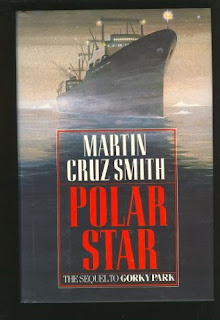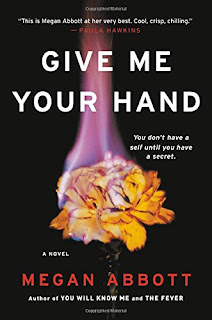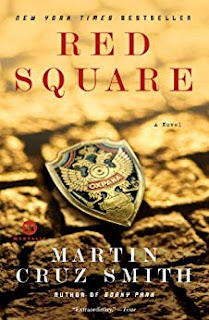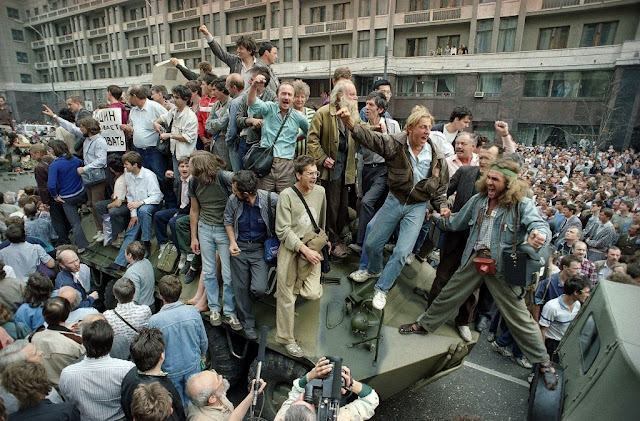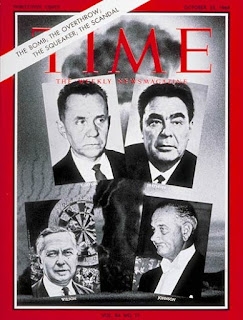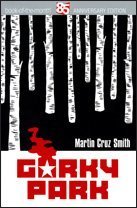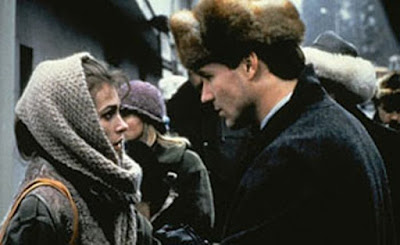Please
consider this an intermission in my weekly reporting on the
eight-episode
series featuring Martin Cruz Smith's incredible Russian police
detective Arkady Renko. I've already reported on two, as you
know—Gorky
Park and Red Square--and will include in
this retrospective details from another two—Polar
Star and Havana
Bay--which leaves, if my
sluggish math prowess serves me correctly, four
to go. Sort of dreading, I am, to even crack the cover of the last
one, Tatiana,
for fear Renko by then will be confined to a wheelchair. Not
that this would even begin to stop him from
solving another hideously complicated murder
with mortally
dangerous adversaries who brutalize and
mutilate him to the very edge of life, nor interfere noticeably with
his enjoying the episodic requisite deeply meaningful sexual
encounter...it’s just that I don’t believe my imagination could
survive unharmed picturing Raymond Burr in the Renko role for any
longer than an SNL skit with, say, Alec Baldwin or a Chris Farley
clone on the wheels.
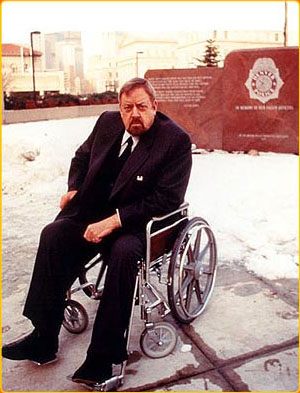 |
Что, черт возьми, ты думал, Смит?
|
That said
(the one act of violence I would gladly compromise my pacifist
convictions for
would be to slap the pus out whatever idiot set the fashion for
narrative transitioning with that silly—moronic,
actually—redundant expression. That
said:
Jesus, makes
me want to smash
something!!! But as we are
a herd-oriented species I, too, am
stuck with it until another idiotic coined
cliché seizes the “intelligentsia” by
its fashionable throat). Where was I? Oh,
yes, that said,
there’s always the chance Arkady Renko by book eight
will have lost faith in his creator, have revolted against the devastating, mutilating circumstances Smith
has prescribed for him, and be solving the murders a la Nero Wolfe
without ever leaving his domicile or engaging physically with anyone
other than the requisite deeply meaningful sexual partner smitten by
his tragic, existentially tormented, Russian eyes.
The first
femme is Irina,
whom Renko meets
in Gorky Park investigating
the murder of three young people,
and for whom he takes
a knife that nearly
kills him after
she shoots
the crooked prosecutor to death, for which he takes
the blame and helps
her escape to New York, which gets
him exiled to Siberia for being an
“unreliable” Communist. That knife, he
is told in the
hospital, “penetrated your colon, stomach
and diaphragm, and also took a nick out of your liver. In fact, the
one thing your friend missed was what he was probably aiming for, the
abdominal aorta. Still, you had no blood pressure when you came in;
then we had to contend with infection, peritonitis, filling you with
antibiotics with one hand and draining you with the other.”
He meets
the second femme, Susan Hightower, in exile
while gutting fish aboard
the Polar
Star, a Soviet factory ship
participating in a joint venture with American fishermen in the
Bering Sea. Susan Hightower, head of an American delegation of
observers aboard the ship is a tough cookie
who only reluctantly
cooperates with Renko after he’s drafted to investigate the death
of a beautiful young promiscuous galley mate whose body turns up in a
netload of fish and leads Renko to evidence
of smuggling and spying aboard the ship.
Susan Hightower
eventually seduces Renko, who has several close calls with mortality
at the hands of fellow
crew members who club him, lock him in a freezer, stab him with an
icepick, try to push him overboard into the
freezing sea, and rag him tediously about being an “unreliable”
Communist.
Back in
Moscow in his old job as an investigator, for a new prosecutor, in a
Russia that’s coming apart at its Communist seams, he and Irina
reunite! It’s a tad rough going at first but eventually, after
Renko solves the ingenious murder of an informant/underworld
wheeler-dealer, they consummate their reunion in the old-fashioned
way, and are last seen hand-in-hand, strolling amongst the thousands
of “unreliable Communist” citizens celebrating the coup that
ended Gorbachev’s reign and nearly a century of tyrannical Red
rule. I believe Renko survived this outing without any new scratches,
punctures, or bruises, but that’s a brief respite, to be made up in
spades in Havana where he flies to identify the remains of what is
believed to be his old KGB adversary-cum-friend Sergei Pribluda.
Here he and
cute, divorced little Cuban Detective Ofelia Osorio fall for each
other in the old-fashioned way after a prickly start in the context
of Cubans hating Russians and not giving a damn if the rotting corpse
found floating in a fisherman’s innertube was Pribluda or Stalin
himself. Of course, the plot thickens quickly and intriguingly and
Renko’s Russian consulate-assigned translator tries to stab him to
death just as Renko is pricking his artery with an air-filled
hypodermic to do to himself what the translator’s there to do for
the mysterious conspiracy. One of those nick-of-time situations in
which the struggle ends with the translator dead on the floor, needle
penetrating his brain, and Renko deciding now is not quite the right
time for what he has
in mind, for which we’ll keep mum for
those of you who wish to read Havana Bay
to find out for yourselves. He also gets
clubbed half to death with an aluminum baseball bat and shot through
an arm with a speargun. I think this sums up all of the injuries.
Physical injuries. Most of the mental ones
he only hints at and then invariably with a
dismissive smartass remark.
In trying
to fathom Renko’s long-suffering endurance—even tolerance—of
these insults to body, mind, and soul, I’ve concluded his trust in
Martin Cruz Smith has got to be so complete and
abiding he somehow knows Smith is not going
to leave him twisting, twisting...in the wind. Twisting once, maybe,
and maybe part of another go-round but
never more than
that before cutting him down, closing his cuts, sewing him up, giving
him a recuperative bottle of Moskovskaya
vodka, and getting him righteously laid.
His droll sense of humor, tho hardly riotous, is consistent and seems
to bear him up long enough to get him out of his corner and back into
the ring for the next seemingly impossible opponent.
 |
| Actually a quote from Stalin |
Wolves
Eat Dogs is next. I promise
I’ll try to do something different with it!
[For
more Friday's Forgotten Books check the links on Patti
Abbott's unforgettable blog]
